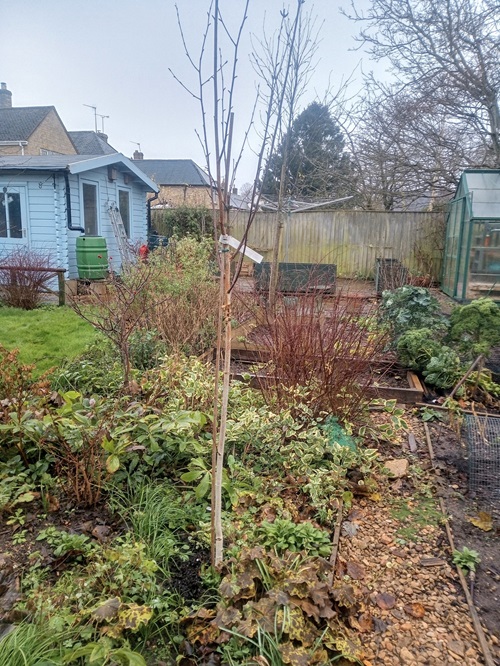Season follows season and, like the weather, we gardeners discuss ad infinitum what to do in our gardens. But really the gardening and allotment calendar stays pretty constant. Dream-Dig-Plant-Weed-Curse (along those lines). Of course, there are moments when we think ‘how lovely that looks’ or ‘how tasty that is’. We’re not completely mad.

This time of year is definitely Dream Time. We’re dreaming now about a pretty little tree we’ve planted in a smallish space in the garden. We wanted something native that wouldn’t grow too large or shade other plants and that would be “good for the environment” because we’ve all got to do our bit apparently. We looked at the Woodland Trust website and it suggested: “combat climate change at home: 6 UK native trees to plant in small gardens”.
Their website claims that ‘each tree in your garden will filter the air around it, absorbing pollutants and locking up carbon in its trunk, roots, and the soil. It can slow the fall of heavy rain and help drink up water from intense storms. Species of wildlife depend on every tree for different reasons. As temperatures rise, water supplies suffer and natural cycles change. Planting more trees increases the chance for wildlife to secure food and shelter during increasing times of trial.’
That’s a lot of responsibility for a little tree.
The Wildlife Trust suggests we plant a Crab Apple, Juniper, Osier Willow, Hazel, Blackthorn or Silver Birch. They all thrive in specific conditions and are valuable for different types of wildlife. Looking at our conditions and wanting something new, we opted for a Silver Birch.
Bought from Applegarth in Chipping Norton, with the 10% discount from MUWAGA membership, it looked a bit forlorn in its little pot. But we planted it. And if we don’t burden it with facts and figures about climate change and how we expect it to solve them all by itself, hopefully it will thrive with time and care. It will provide seeds, host insects, and give shelter for small birds such as long-tailed tit, siskin, greenfinch and redpoll for many years to come.
